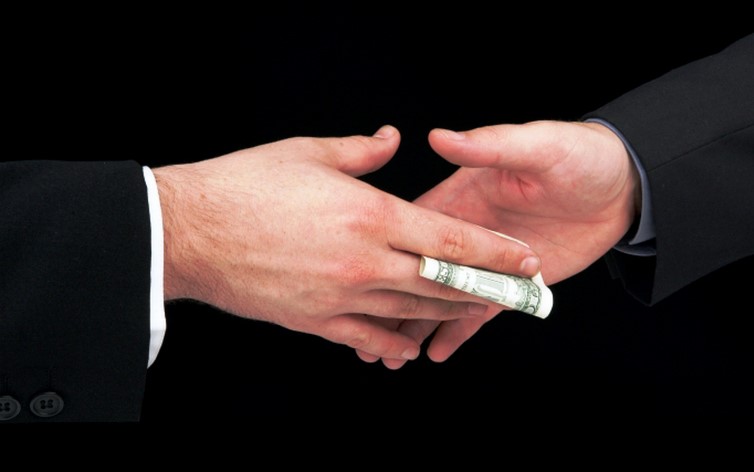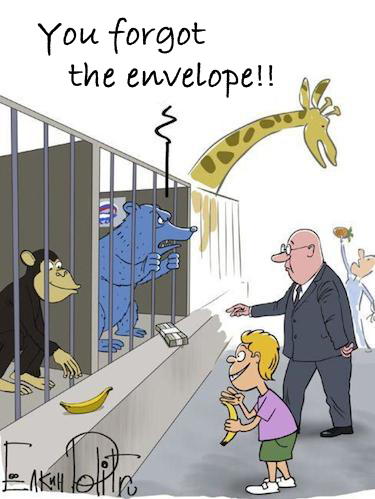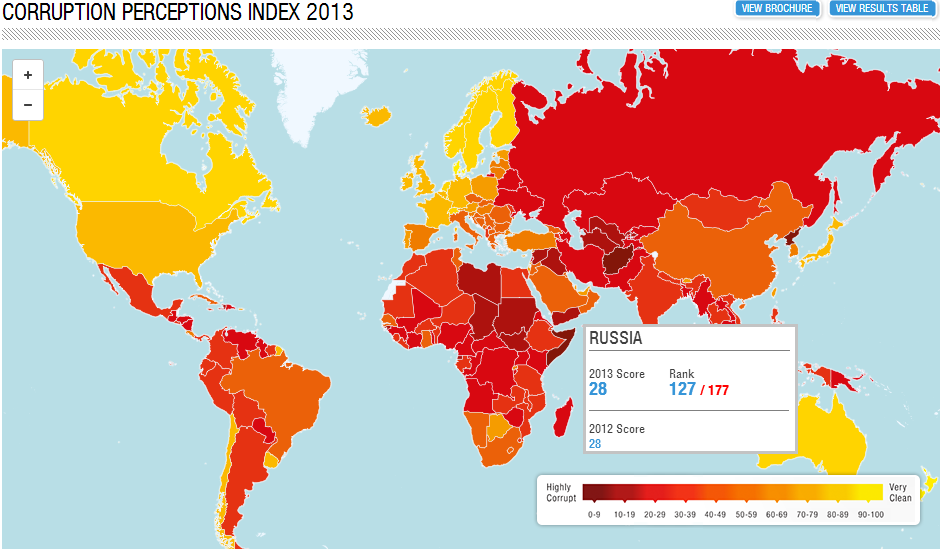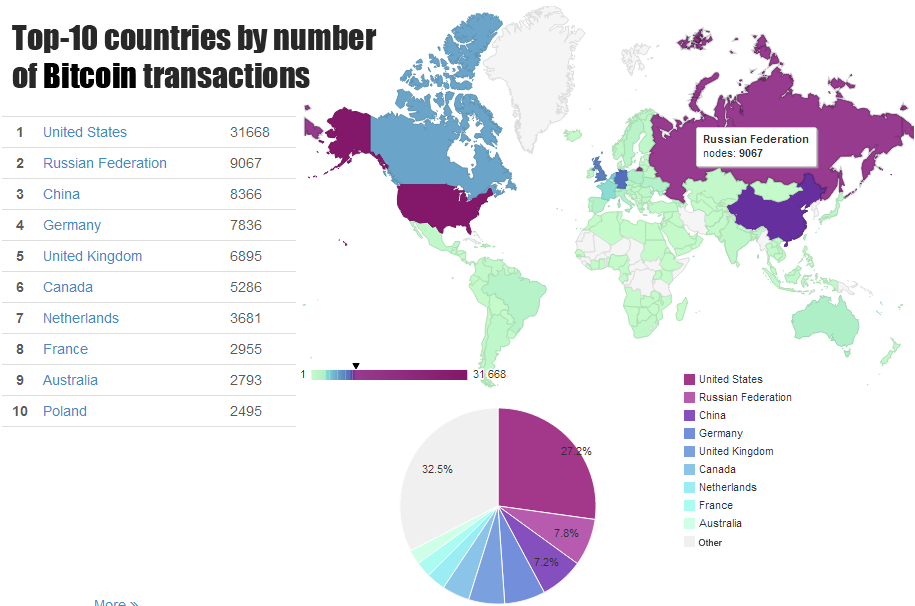
Let’s face it: the risk of money laundering, which is often cited in statements on cryptocurrencies by numerous central banks across many countries does not affect the average person. The overwhelming majority are not “terrorists” and do not seek to procure illegal drugs nor deal in weapons or human trafficking.
But what if this notorious “money-laundering enabling” digital currency could be used by the same people who are in power for their own benefit? What if all these incredible opportunities promised by the new Bitcoin economy are turned against us, the public?
Here Comes the Bribe
It is no secret that in Russia many problems are resolved with good, old-fashioned bribes. Other popular methods include under-the-table (black) salaries, embezzlement and kick-backs. This was common practice until January 15, 2014 when the State Duma introduced a serious of revisions to the current law, aimed at preventing the laundering of revenue streams, while attempting to better control financial operations and flow of information in telecommunications networks.

But it’s one thing when a school teacher receives a gift certificate from a student. It’s another when, all of a sudden, the mother-in-law of a Ministry of Sports official has a mansion built for her in Rublyovka.
Both of these instances can be called bribery, though evidently of different degree. But let’s remember that in the world of Bitcoin, the transaction amount does not affect the flat transaction fee rate, which is almost near-zero.
Thus, filing suitcases with cash, forging fingerprints, passport information, and setting up offshore accounts can become quite burdensome. Such was the case, until Bitcoin.
How to take bribes with Bitcoin
So, if you are a government official (regardless of whether in Russia, Nigeria or any other country) and you want to take a bribe without getting caught, these instructions are for you. For starters, let’s look at the benefits you will receive with a Bitcoin bribe.
Benefits
- Free. Money is sent to digital wallets, which have their own unique addresses just like email. Anyone can create and set up as many wallet addresses as they wish at absolutely no cost. It is recommended to set up a new wallet for each new incoming bribe. It is even better to ask the client to split the amount into several parts and send each one to a different wallet address. Wallets with smaller amounts can be distributes to your children, while anything substantial can be given to your wife or mother-in-law.
- Pseudo-anonymity. No one knows who the owner of the wallet is until the owner reveals himself. But be careful since it’s possible to reveal yourself unintentionally. For example, be careful when converting bitcoins to fiat currencies (rubles, dollars, euros). Exchanges frequently require personal information and probably save all of their transactions data. The authorities can easily order the exchange to disclose this information to uncover your identity. The same goes for purchases with Bitcoin – your shipping address and passport information that you presented to receive you package will give you away. Transfers to private bank accounts will likewise destroy any chances to get away clean.
- No limits. Bitcoins are simply numbers. This is why there is no limit and any amount could be sent with the same negligible transaction fee.
- Speed. Transactions are confirmed by the Bitcoin network after a few minutes. The more times a transaction was confirmed by other users, the less likely this action can be forged (double-spent). Here it is up to you – you have time and the amounts can be quite large so wait until, let’s say 100 confirmations are received for large transactions. While as little as three could be enough for smaller transactions. You can check the status of your transactions at blockchain.info.
- No regulations. To date, there is no official legislation regarding cryptocurrencies in Russia and, thus, there exists an assumption of innocence. In other words, prosecutors must prove that the accused person is guilty of the alleged crime. Corpus delicti is usually how regular and non tech-savvy bribe-takers are caught. But Bitcoin is not recognized in Russia. It is not “money” nor bonds or securities. From the government’s standpoint, Bitcoin is nothing, which means you can accept bitcoins “as a gift” while offering your services in exchange – out of your general good-will, of course.
- Taxes. None.
- Washing. It is very easy to hide your tracks. Many services exist that “mix” transactions so that bitcoins from other users are pooled together and shuffled around, after which they are redistributed to new wallets (some of which are belong to you). Moreover, there are more than 150 cryptocurrencies in existence today and some of them can be bough and traded on various exchanges. It is possible to convert one into the other, transfer amounts, convert back, rinse and repeat. Of course, you will lose a small percentage due to fees, but it is ultimately up to you just how much you want to tangle and jumble your transaction history.
Getting Started
Now let’s look at how to actually go through the process of taking bribes in Bitcoin. Let’s pretend that you are once again an ethically-challenged government official.
- To start, you must create a digital wallet. You can read about the many types of wallets here. You can also create a brain wallet so that nothing is found if your computer is seized and searched.
- Tell your counterparty the address of your wallet and the desired amount.
- The person sending the bribe will purchase bitcoins for fiat currency on an exchange and send the amount to your address.
- Even if the person sending the bribe turns out to be straw man, the pseudo-anonymity principle remains and the lack of legal precedents will make it harder for prosecutors to prove that the wallet actually belongs to you. Why can’t the wallet address belong to a non-profit organization? It can also be assumed that some children’s foster home won’t hesitate to declare themselves as the owner of this address, especially if the benevolent mystery man will leave an envelope with a private key at their doorstep.
- Take advantage of the tools offered by online resources such as blockchain.info, where both sides can track the status of the transaction.
- Offer your regular services to the person who sent you the bribe, keep calm, and continue embezzling tax-payer money.
- Give the private key to your wife and send her on a trip to the south of France where she can spend these funds. If someone asks your wife where she got the money, keep yourself completely out of the loop since she obtained the money selling some kind of goods or services.
A Look at the Numbers
As the popular Russian aphorism goes - “Since it’s impossible to earn all the money, some of it will have to be stolen.” But we know that every joke contains some element of truth, so just how much of this element is there?
Below is a map of the world showing the level of corruption for 2013 from Transparency International based on the Corruption Perception index, where Russia sits at spot 127 out of 175. The closer the color is to maroon, the higher the level of corruption in the given country.

Based on the data in the corresponding Wikipedia page:
In 2006, the All-Russian Public Opinion Research Center performed a study, as a result of which the attitude towards bribers softened and a large number of the population does not even consider corruption to be a crime, while over a half of the people surveyed had personal experience with bribes.
Now, let’s take a look at another map. Just in the past few days, Russia leapfrogged past China into second place by the number of transactions per unit time. Thus, Bitcoin appears to be more popular in Russia than it seems.

It was never easier to receive a bribe than it is now. So when a policeman stops you and flashes his QR-code after flashing his badge, don’t be surprised.
Disclaimer: The views expressed in this article are not intended to facilitate corruption and are used in a satirical manner to point out the hypocracy of the proposed regulations, bans and fees places on Bitcoin related activities.
